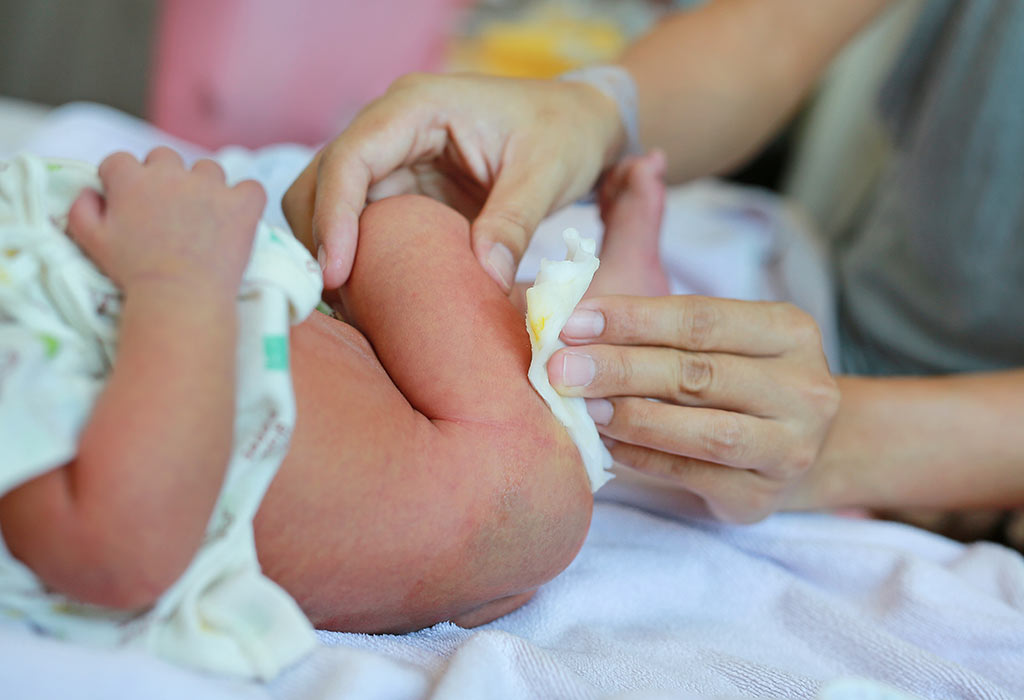
Your baby would be passing little stool frequently till 6 weeks or 2 months. If your baby suddenly pooped so much before 2 months old, there’s nothing to worry about.
One-month-old baby poop frequency is 5/day on average. When you should be worried about your baby’s bowel movement is when there’s diarrhea accompanied by fever or strange coloration of the poop.
While babies poop frequently, the consistency, smell, and color of the stool can also indicate an illness.
Baby’s Bowel Movement and Development
A baby usually has 1 to 8 bowel movements a day for the first 4 weeks of life.
Your baby’s poop frequency, smell, and color are strongly linked to a baby’s developmental stages.
For example, your baby’s poop and fart would not smell before he’s about 2 months, and after this age, they now smell bad.
Breastfed babies are not likely to constipate compared to babies feeding on formula.
Breastfed babies poop more frequently than bottle-feeding babies because breast milk digests better and faster than processed milk.
Poop Colors
Baby meconium appears in the newborn diaper, and in the first few days after birth, the poop’s color is green-black and it appears almost tarry and sticky.
This type of stool, which mainly contains swallowed amniotic fluid does not smell, compared to the poop of the baby after 1 month which is lighter, and yellowish.
Breastfed babies often have mushy, creamy, yellow-colored stools that are relatively liquid.
The smell is not unpleasant. The color also depends on what the nursing mom ate.
Although the consumption of spinach does not cause a change in the color of breast milk, it is often reflected in a greenish nappy content.
Depending on whether the newborn is on breast milk or infant formula, the stool will also appear differently.
Digestion and Poop frequency
2nd month of life, it is normal for both breastfed and bottle-fed babies to go without pooping for days, sometimes, up to 1 week as their digestive system is better, and can process the nutrients in their foods better.
Breastfeeding mothers often worry that their baby will suffer from diarrhea because the stool appears very thin.
This is normal for many breastfed babies, but should still be clarified by a doctor if necessary.
For example, a greenish-slimy-frothy stool may indicate that the baby is getting an insufficient portion of breast milk.
If the green color of the stool cannot be attributed to the mother’s diet, the cause may be a too fast, too immature bowel movement.
In rare cases, a medicinal plant treatment is advisable for the healthy digestion of the baby.
However, this (including the administration of tea) should always be discussed with the midwife or pediatrician.
If an infant is bottle-fed instead of breastmilk, the stool will be more peanut butter and doughy with a yellow to greenish-brown color.
The stool odor is more intense than that of babies who only take breast milk.
Drugs and Baby’s stool
If a baby receives an additional iron preparation as a dietary supplement, the diaper contents are often very dark.
The almost green-black color is caused by the addition of iron. If such a stool color occurs without the administration of iron supplements, the dark discoloration can also be due to blood. This should be checked out by a doctor.
Can Solids make a Baby constipated?
Do you wonder why your baby’s poop is hard? Switching from breastmilk or formula to solid foods affects bowel movements.
Even the foods a breastfeeding mom takes can also affect the baby’s poop and cause constipation if low in fiber.
Bananas, rice, sweet potatoes, and whole grains are examples of foods that can constipate a baby that’s less than a year old.
Any food that’s rich in fiber, however, would help with hard stool. Also, water and fruits with high water content.
Poop of Solid eating babies
The stool is usually still mushy but smells stronger and the color is often darker, but it’s still yellowish.
Sometimes, there are still undigested foods left in the stool, such as corn kernels, blueberry skins, or pieces of tomato.
This is normal and indicates that the baby is not yet able to chew or break up the food sufficiently in the mouth.
This can happen especially when a baby eats a lot of food and only has a few teeth.
Constipation, diarrhea, blood, and mucus in Poop
Water-like, foul-smelling yellowish, greenish, or brown, diarrhea often swells or gets through the diaper.
If diarrhea occurs very often in a short time, within a few hours, and is also accompanied by vomiting, there is a risk of dehydration, especially for babies and children.
If your child does not have energy, is pale, and is lethargic, try to see your doctor. If necessary, an infusion is necessary to ensure adequate fluid intake.
Medical advice should also be sought if there is mucus or blood in the baby’s stool.
If diarrhea occurs without affecting the baby’s well-being, the pediatrician should still be consulted if parents are unsure or if diarrhea lasts longer than 2 to 3 days. This also applies to constipation.
Hard stools can also be very distressing for a baby. Too little liquid or food intolerance can cause hard stools, for example.
Digestion can be promoted naturally with plum or pear juice. Tea and medication should always be given under the supervision of a doctor or midwife.
Since a very hard stool can sometimes lead to injuries to the anus, constipation can sometimes result in blood in the diaper.
Milk protein allergies and infections can also cause blood in the stool.
If there’s a sore in your breast nipples, it’s possible your baby sucks blood with breast milk, and appears again in their stool – this is not a cause for alarm. Nevertheless, it should be clarified by a doctor whether this is the cause.
Conclusion
The consistency of your baby’s stool is dependent on your baby’s diet and developmental stage.
3 to 5 bowel movements are common for most babies under 1 month, however, from the 4th week of life, fully breastfed children may not poop daily again.
It is common for newborns to have digestive problems such as flatulence and colic.
The reason is that the baby’s digestive organs are not fully developed. Preparations containing intestinal bacteria can be given to babies having digestive issues.
getting your baby hydrated can also help since many babies have a bowel movement shortly after a drink (gastrocolic reflex)
Some babies are very sensitive to the foods their nursing mothers eat. You have to try this out on an individual basis, as there are no foods that should generally be avoided while breastfeeding
Seek medical advice if your baby poops too much after 2 months or if not having a bowel movement for more than 5 days.





